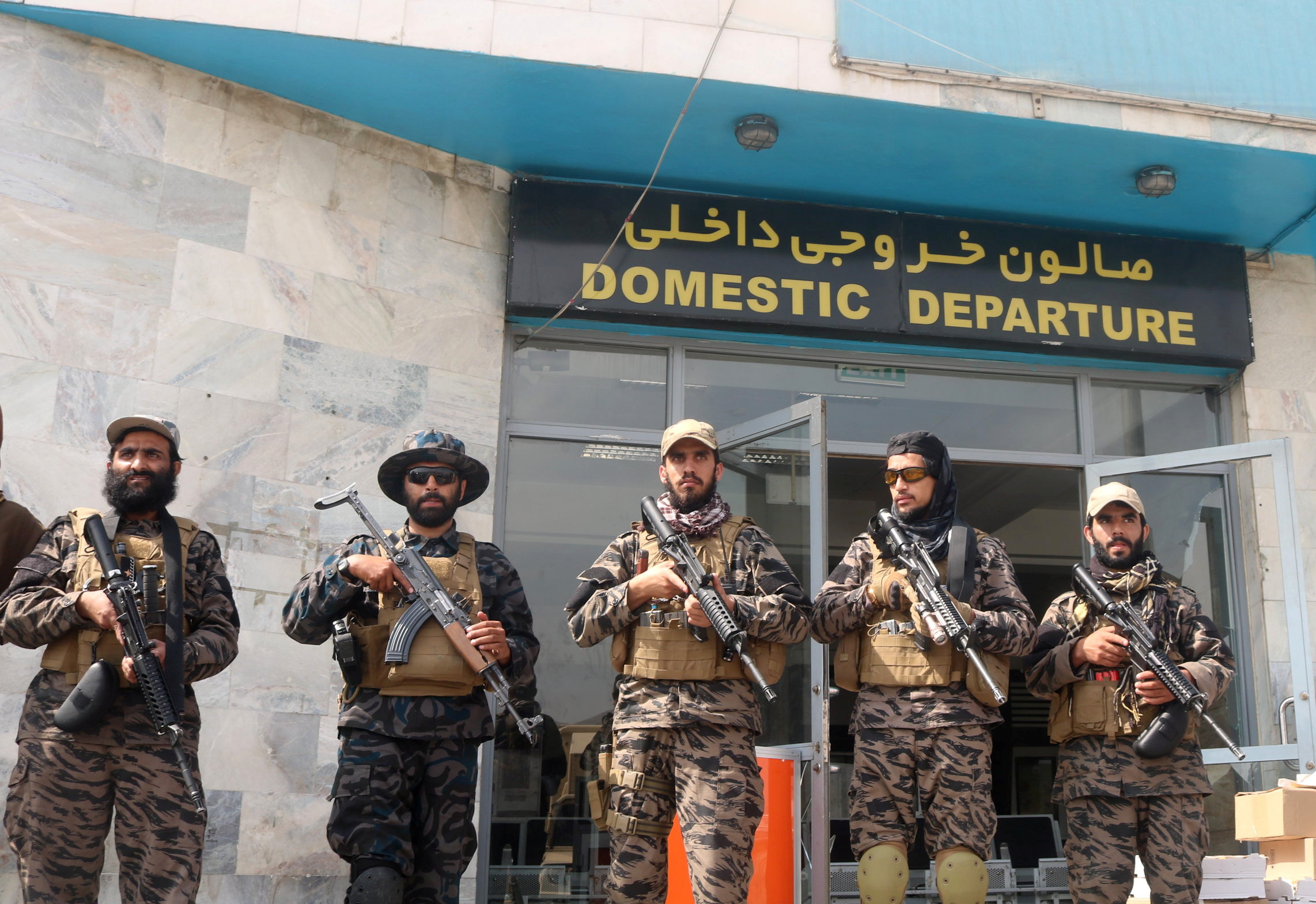
With airport closed, fearful Afghans scramble for the border

(Reuters) -Crowds seeking to flee Afghanistan gathered on its borders while long queues formed at banks on Wednesday, as an administrative vacuum after the Taliban’s takeover left foreign donors unsure how to respond to a looming humanitarian crisis.
The Islamist militia focused on keeping banks, hospitals and government machinery running after the final withdrawal of U.S. forces on Monday put an end to a massive airlift of Afghans who had helped Western nations during the 20-year war. With Kabul’s airport inoperable, private efforts to help Afghans fearful of Taliban reprisals focus on arranging safe passage across the land-locked nation’s borders with Iran, Pakistan and central Asian states.
At Torkham, a major border crossing with Pakistan just to the east of the Khyber Pass, a Pakistani official said: “A large number of people are waiting on the Afghanistan side for the opening of the gate.” Thousands of people also flocked to the Islam Qala border post between Afghanistan and Iran, witnesses said.
“I felt that being among Iranian security forces brought some kind of relaxation for Afghans as they entered Iran, compared with the past,” said one Afghan who was among a group of eight that crossed into Iran. More than 123,000 people were evacuated from Kabul in the U.S.-led airlift after the Taliban seized the city in mid-August, but tens of thousands of Afghans at risk remained behind.
Germany alone estimates that between 10,000 and 40,000 Afghan staff still working for development organisations in Afghanistan have a right to be evacuated to Germany if they feel endangered. In a resolution on Monday, the U.N. Security Council urged the Taliban to permit safe passage for those seeking to leave Afghanistan, but it did not mention the creation of a safe zone, a step backed by France and others. French Foreign Minister Jean-Yves Le Drian said the Taliban were in talks with Qatar and Turkey about the management of the airport in the capital.
The Taliban have declared an amnesty for all Afghans who worked with foreign forces during the war that ousted it from power in 2001 for refusing to hand over al Qaeda leader Osama bin Laden following the Sept. 11 attacks on the United States. Taliban leaders have also called on Afghans to return home and help rebuild, while promising to protect human rights, in an apparent bid to present a more moderate face than their first regime, known for its brutal enforcement of radical Islamic law.
The militia made similar promises when it seized power in 1996, only to publicly hang a former president, ban women from education and employment, enforce strict dress codes and adopt a punitive approach to the people of Kabul. One woman said she saw Taliban fighters beating women with sticks outside a bank in the Afghan capital on Tuesday. “It’s the first time I’ve seen something like that and it really frightened me,” the 22-year-old said, on condition of anonymity, because she feared for her safety.
NO NEW GOVERNMENT YET
The Taliban have yet to name a new government or reveal how they intend to govern, unlike in 1996, when the insurgents formed a leadership council within hours of taking the capital. The foreign minister of neighbouring Pakistan, which has close ties to the Taliban, said on Tuesday he expected Afghanistan to have a new “consensus government” within days.
In the absence of a government in Kabul, Britain and India held separate talks with Taliban representatives in Doha amid fears that up to half a million Afghans could flee their homeland by year-end. Washington said it would use its enormous leverage, including access to the global marketplace, over the Taliban as it seeks to get the remaining Americans and allies out of Afghanistan after the U.S. military withdrew.
Last week, the United States issued a licence authorising it and its partners to continue to facilitate humanitarian aid in Afghanistan even though the Taliban is blacklisted by Washington, a Treasury Department official told Reuters.
Pentagon spokesman John Kirby also said the United States was mindful of the threat posed by ISIS-K, the Afghanistan-based Islamic State affiliate that claimed responsibility for last week’s suicide bombing outside Kabul airport that killed 13 U.S. service members and scores of Afghan civilians.
ISIS-K is an enemy of the West and the Taliban, who also face armed resistance from opposition groups, including remnants of the Afghan army. At least seven Taliban fighters were killed in clashes with anti-Taliban rebels in the Panjshir valley north of the capital on Monday night, two rebels said.
The United States has not ruled out military strikes against ISIS in Afghanistan, but President Joe Biden said on Tuesday the days of nation-building through military force were over. Biden portrayed the chaotic exit as a logistical success that would have been just as messy even if launched weeks prior, while staying on would have required more American troops.
“This decision about Afghanistan is not just about Afghanistan,” he said. “It’s about ending an era of major military operations to remake other countries.”
(Reporting by Reuters bureaus; Writing by Stephen Coates; Editing by Clarence Fernandez)

















POST COMMENTS (0)